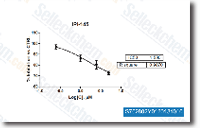The resultant discordance amongst principal and metastatic CRC is consist ently demonstrated. This highlights a significant limitation of cohort studies assessing the predictive value of PTEN loss in mCRC patients that have utilised only pri mary CRC specimens for evaluation. Plainly the part of PTEN is more complex than KRAS gene mutation where just one identifiable mechanism, largely concordant amongst major and secondary tumours, confers close to full resistance to anti EGFR MoAbs. Comprehending this complexity is central to interpreting the present literature relating to PTEN and its potential part like a predictive biomarker. Re cently reported cohorts of mCRC individuals receiving anti EGFR MoAbs have applied PTEN loss of IHC expression to report loss of PTEN perform.
Whilst this represents the practical end result of numerous genetic mechanisms of PTEN reduction, IHC relies on subjective interpretation and has the prospective for inter reporter variation. Additionally there is certainly variability in excess of the definition of reduction of PTEN based on IHC scoring. From the largest cohort of mCRC DZNeP concentration pa tients, PTEN loss was defined as no staining in any cells at any intensity, though other groups have utilized a variety of minimize offs of reduced PTEN expression. Many others groups investigating the predictive role of PTEN have assessed PTEN allelic reduction by fluorescent in situ hydridiza tion, PTEN mutation, and PTEN promoter methylation but concordance with reduction of PTEN expression by IHC remains unclear. The consistent demonstration of PTEN like a useful biomarker in mCRC has been, and will continue to get, constrained until eventually evaluation of PTEN loss is far better clarified and validated.
Our group undertook an evaluation of PTEN standing inside the AGITG MAX examine of mCRC individuals to recognize the fee of inter observer variability in IHC assessment as well as price of discordance amongst IHC and PCR assessment of PTEN status. Procedures Sufferers and research style and design The MAX Dioscin review design and eligibility criteria have been reported previously. The main objective of this Phase III randomized trial was to assess the impact of adding bevacizumab to capecitabine on pro gression  free of charge survival between individuals acquiring very first line chemotherapy for mCRC. 4 hundred and seventy 1 sufferers have been enrolled concerning July 2005 and June 2007. We’ve made use of the TaqMan Copy Quantity Assay to assess for PTEN allelic loss and have previously reported that loss of PTEN copy quantity was not prognostic nor predictive of end result from the MAX trial cohort. In this report we randomly selected 59 tumor samples to discover the prospective inter observer variability concerning pathologists evaluation of PTEN loss of expression by IHC, and concordance of IHC PTEN loss and the Taqman outcomes. Ethics approval for translational research was obtained centrally.
free of charge survival between individuals acquiring very first line chemotherapy for mCRC. 4 hundred and seventy 1 sufferers have been enrolled concerning July 2005 and June 2007. We’ve made use of the TaqMan Copy Quantity Assay to assess for PTEN allelic loss and have previously reported that loss of PTEN copy quantity was not prognostic nor predictive of end result from the MAX trial cohort. In this report we randomly selected 59 tumor samples to discover the prospective inter observer variability concerning pathologists evaluation of PTEN loss of expression by IHC, and concordance of IHC PTEN loss and the Taqman outcomes. Ethics approval for translational research was obtained centrally.
MiRna Assay
MiRNA or precursor miRNA assays for microRNA research
